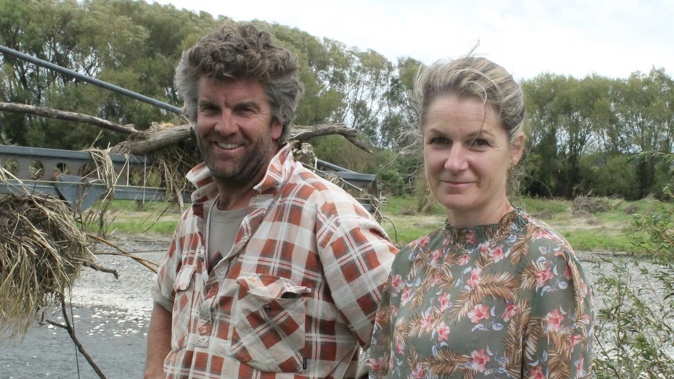
At around three in the morning, the flood alert went off.
It was Tuesday, February 14.
Blair Castles had checked the river levels at around 6.30pm the night before, and the Manawatū River had been sitting at 1.4 metres high.
Thinking he had plenty of time to take out the irrigation pumps if the water level rose, he decided to wait until milking time the next day.
But at 3am, the alert, set to warn him and wife Naomi when the river was at 5.2m, went off.
Blair checked it again less than an hour later.
“It was still coming up pretty quick. That’s when the day began.”
The couple’s Dannevirke farm is situated within the catchment of the Manawatū River, which starts around Norsewood.
“Everything from Norsewood has to go through here.”
Blair said the trouble was really due to the easterly, so the heavy rain from Cyclone Gabrielle hit the ranges and then came down.
“The easterly will always hit us up here on the Manawatū River.
“As soon as the eye of that storm was in Gisborne, we knew we were in strife.”
/cloudfront-ap-southeast-2.images.arcpublishing.com/nzme/XXJXHZORMBAJBFCIA4PP6E7U5Y.jpg)
About three-quarters of the property was flooded.
While they were surprised by how quickly the river rose, it dropped fast as well, although they knew if there was another heavy downpour, the river could have easily flooded again.
The couple said about 75 per cent of the farm was underwater, bringing down fences and destroying tracks.
Within hours the offers of help were pouring in, from manpower to offers of baking.
“The day after it happened, mates were here with tractors and trailers and we had the diggers going,” Blair said.
They had to deal with holes and culverts blown out, cutting off access to the lower paddocks.
“Our first job was to repair tracks so we could get access.”
Much of that involved dealing with logistical issues, making sure that those working were able to do so safely.
Given the amount of work to be done, Blair said he didn’t say no to any offers of help.
“We thought we would have a small working bee, but the word spread fast as others helped organise crews to come and give us a hand.”
By Saturday, about 70 people were there to help clear both the Castles’ farm and neighbouring farms.
Help came from far and wide, with farmer-led teams established to explain the jobs required to the willing workers.
“They understood it, the farming community,” Blair said.
“They brought their own tools, four-wheelers, utes and water pumps,” he said.
Naomi and Blair looking out over the damage beside the Manawatū River. Photo / Leanne Warr
Blair and Naomi can’t say enough how grateful they were to the community.
“It was just pretty humbling,” Blair said.
The couple said that if it hadn’t been for the help they received in the first two weeks after the cyclone, their farm would not be where it is now, which they estimate is about “95 per cent there”.
With just them and their staff, they would probably have cleared only 10 per cent.
“We would have probably had to dry the cows off, to be honest,” Blair said.
Not being able to milk the cows could also cause significant problems for the herd.
“If you can’t milk them for three days, you’re just going to have a herd of mastitis … [which] is bloody expensive, and it can really be harmful.”
They had offers from farmers to graze some of the milking herd for a couple of weeks, which would take some of the pressure off, and had phone calls from those they had business dealings with offering assistance.
Naomi and Blair don’t want to single anyone out, because what was more important was that everyone pitched in in some way.
“It’s all sort of one community when it comes down to a national state of emergency,” Blair said.
Naomi said she wanted to let people know just how much of a difference it made.
“We really appreciate everyone’s support. The transformation of the farm was amazing and the result of the hard work of many. People gave up a lot of their time to come and give us a hand.
“The community effort meant we were able to quickly get back up and running.”
They still have a bit of work to do, even as farming work carries on.
“When we get time, we just go down and chip away and do a little bit,” Blair said.
The damage to the stopbank. Photo / Leanne Warr
Much of it will be ongoing, for instance on repairing stopbanks, where there was a lot of damage.
“I’m hoping to get it done before winter, because we’re a sitting duck with no stopbank there. But that’s not a two-minute job to fix.”
Take your Radio, Podcasts and Music with you

/cloudfront-ap-southeast-2.images.arcpublishing.com/nzme/G6LGB7UVIVB3JIGQCD355KMBGI.JPG)
/cloudfront-ap-southeast-2.images.arcpublishing.com/nzme/JKA3ZYGRAZGN3HJY6V7BSSWPYE.JPG)








